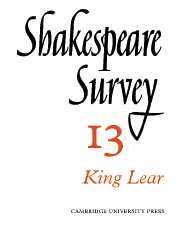Book contents
- Frontmatter
- The Catharsis of King Lear
- Lear’s Last Speech
- Albany
- Madness in King Lear
- The Influence of Gorboduc on King Lear
- Some Aspects of the Style of King Lear
- Keats and King Lear
- King Lear on the Stage: A Producer’s Reflections
- Costume in King Lear
- The Marriage-Contracts in Measure for Measure
- Tom Skelton—A Seventeenth-century Jester
- Illustrations of Social Life III: Street-Cries
- An Elizabethan Stage Drawing?
- Was there a Music-room in Shakespeare’s Globe?
- International Notes
- Shakespeare Productions in the United Kingdom: 1958
- Three Adaptations
- The Year's Contributions to Shakespearian Study 1 Critical Studies
- 2 Shakespeare’s Life, Times and Stage
- 3 Textual Studies
- Books Received
- Index
- Plate Section
The Marriage-Contracts in Measure for Measure
Published online by Cambridge University Press: 28 March 2007
- Frontmatter
- The Catharsis of King Lear
- Lear’s Last Speech
- Albany
- Madness in King Lear
- The Influence of Gorboduc on King Lear
- Some Aspects of the Style of King Lear
- Keats and King Lear
- King Lear on the Stage: A Producer’s Reflections
- Costume in King Lear
- The Marriage-Contracts in Measure for Measure
- Tom Skelton—A Seventeenth-century Jester
- Illustrations of Social Life III: Street-Cries
- An Elizabethan Stage Drawing?
- Was there a Music-room in Shakespeare’s Globe?
- International Notes
- Shakespeare Productions in the United Kingdom: 1958
- Three Adaptations
- The Year's Contributions to Shakespearian Study 1 Critical Studies
- 2 Shakespeare’s Life, Times and Stage
- 3 Textual Studies
- Books Received
- Index
- Plate Section
Summary
In a valuable essay on Measure for Measure, published in 1942, L. C. Knights, discussing Shakespeare’s presentation of Claudio, expressed his belief that ‘it is the slight uncertainty of attitude in Shakespeare’s handling of him that explains some part, at least, of the play’s disturbing effect’. The source of this uncertainty he finds in ‘feelings at war with themselves’ in the poet, the result of a temporary ‘emotional bias’ that ‘seems to blur some of the natural positive values which in Macbeth or Lear are as vividly realized as the vision of evil’. Apparently alone among commentators he points to ‘something odd and inappropriate’ in Claudio’s attitude towards the offence for which he has been sentenced to death. Upon Claudio’s first appearance on the stage the following conversation takes place between him and Lucio:
Lucio. Why, how now, Claudio! whence comes this restraint?
Claudio. From too much liberty, my Lucio, liberty:
As surfeit is the father of much fast,
So every scope by the immoderate use
Turns to restraint. Our natures do pursue,
Like rats that ravin down their proper bane,
A thirsty evil; and when we drink we die.
[…]
- Type
- Chapter
- Information
- Shakespeare Survey , pp. 81 - 89Publisher: Cambridge University PressPrint publication year: 1960

